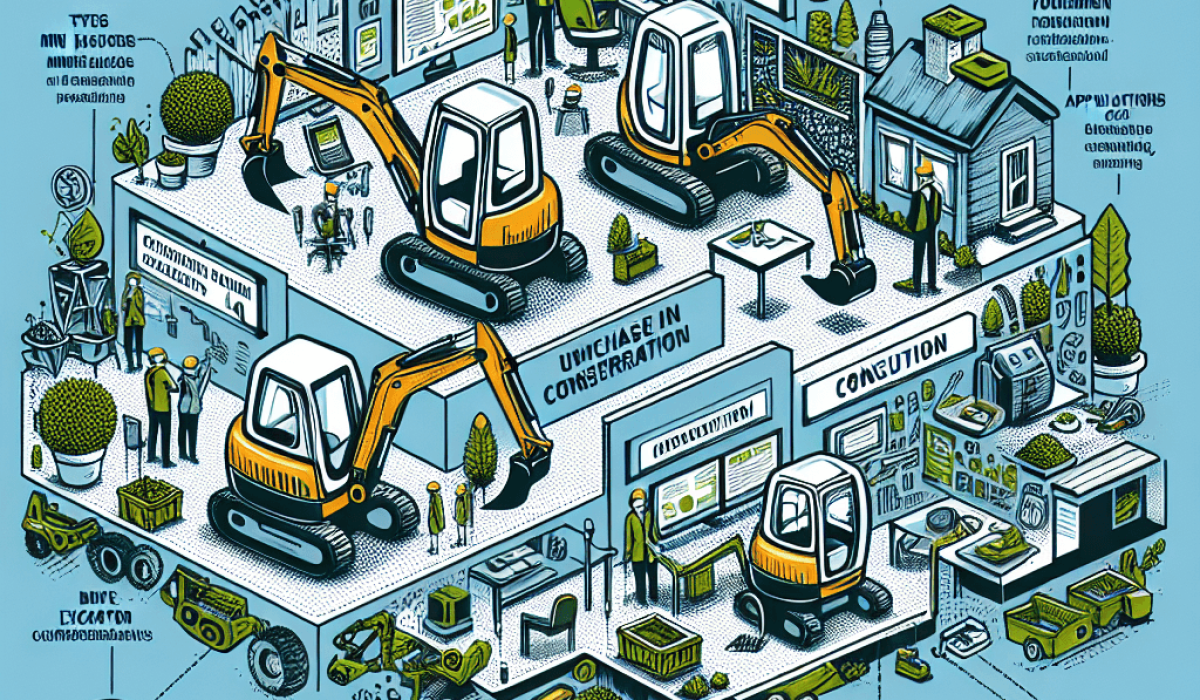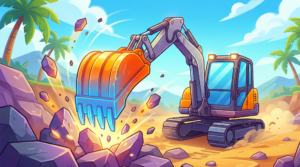Five the primary segments define the construction equipment market: earthmoving equipment, road building equipment, concrete equipment, material handling equipment, and material processing equipment. Of these segments, earthmoving machinery holds a sizable proportion—more than 60 percent of the entire market share. Backhoe loaders, skid steer loaders, and excavators among other machines in this category are quite important for building and excavation activities. But given their quick ascent on the market, the tiny excavators need especially close attention. With a reported yearly increase of around 12.5% from 2015 to 2019, the mini excavator market in India shows especially amazing expansion according to a Research and Markets analysis. This strong trend is expected to continue, which emphasizes even more the essential value of micro excavators in contemporary building techniques.
Decoding Mini Excavators
Real estate, infrastructure, urban development, general construction, and agriculture projects frequently involve critical tasks such as digging, backfilling, utility works like pipe and cable laying, and material movement—all of which are performed in environments where space is often limited. This context elevates the significance of mini excavators. These machines, classified as compact, lightweight, and portable tracked vehicles, excel in the earthmoving equipment category. Typically, mini excavators weigh less than 8 tons and include a standard backfill blade and an independent boom swing, allowing them to interface seamlessly with a diverse array of attachments.
Mini excavators fall into two categories: conventional tail swing and zero tail swing models. Each type offers distinct benefits; conventional tail swing models feature a larger swing radius, enhancing lift capabilities as well as bucket and arm breakout force, making them suitable for tasks requiring more robust performance. Conversely, zero tail swing mini excavators are specifically designed for operations in confined spaces, allowing for precise digging close to walls without the risk of obstruction. Overall, mini excavators exemplify a remarkable blend of powerful performance and agility, making them indispensable in modern construction and excavation operations.
Discover the Power of Mini Excavators
In today’s dynamic world of construction and landscaping, mini excavators have emerged as a game-changer. Their compact size and versatility have made them an essential tool for construction professionals, DIY enthusiasts, and landscapers alike. This blog post will explore everything you need to know about mini excavators, including their applications, benefits, and future trends. Whether you’re considering purchasing one or just curious about their capabilities, read on to uncover the power of these mighty machines.
Understanding Mini Excavators and Their Roles
Mini excavators have gained prominence for their adaptability in various industries. These small but powerful machines are designed to perform tasks that their larger counterparts struggle with, such as operating in tight spaces and delicate environments. Mini excavators weigh between one to six tons, making them ideal for projects where space and precision are crucial.
Their importance spans several industries, including construction, landscaping, and even some DIY projects. Construction professionals rely on mini excavators for tasks like digging foundations, trenching, and breaking concrete. Landscapers use them to shape terrain, remove stumps, and install water features. For DIY enthusiasts, mini excavators can make home renovation projects faster and more efficient by simplifying heavy lifting and earth-moving tasks.
Sorting Through Types of Mini Excavators
Mini excavators come in various types, each tailored for specific needs. Understanding these categories will help you choose the right excavator for your project.
Categorizing by Size
Mini excavators are typically classified into three categories based on size:
- Compact Mini Excavators (1-3 tons): Perfect for small-scale projects and tight spaces.
- Standard Mini Excavators (3-5 tons): Suitable for larger construction and landscaping jobs.
- Midi Excavators (5-6 tons): Bridge the gap between mini and full-size excavators, offering more power and reach.
Functionality Matters
Functionality is another critical factor. Some mini excavators are equipped with advanced features like zero tail swing, which allows the machine to rotate within its footprint without risking damage to surrounding structures. Others might have extendable undercarriages for increased stability or additional hydraulic attachments for versatility in different tasks.
Unleashing Mini Excavator Applications
Mini excavators have a wide range of applications across different fields.
Construction Projects
In construction, they’re used for digging trenches, foundations, and utility lines. Their compact design allows them to work in urban environments where space is limited, reducing disruption to surrounding areas.
Landscaping Solutions
Landscapers favor mini excavators for shaping and grading land, removing tree stumps, and installing hardscapes like patios and retaining walls. Their maneuverability is perfect for accessing backyard spaces without damaging existing landscapes.
DIY Enthusiasts
For DIY enthusiasts, mini excavators can simplify projects such as pool installations, garden redesigns, or building outdoor structures. Renting a mini excavator can save time and reduce manual labor, making ambitious DIY projects more achievable.
The Advantages of Choosing a Mini Excavator
Mini excavators offer several notable advantages that make them a preferred choice for many professionals and hobbyists.
Efficiency and Productivity
Their compact size allows operators to work efficiently in confined spaces and on complex terrains. The ability to switch between various attachments quickly further boosts productivity, enabling a single machine to perform multiple tasks.
Cost Savings
Mini excavators are more cost-effective than full-sized machines due to lower purchase or rental costs. They also consume less fuel, reducing operational expenses. This makes them an attractive option for small to medium-sized projects.
Environmental Benefits
Mini excavators produce fewer emissions compared to larger equipment, which is advantageous for environmentally conscious projects. Their reduced environmental footprint aligns with sustainability goals and regulations, making them a smart choice for eco-friendly construction and landscaping.
Major Benefits Offered by Mini Excavators
Works Efficiently in Confined Spaces
Mini excavators excel in environments where space is at a premium. Their compact design allows them to navigate tight areas, pass through small gates, and operate effectively at crowded job sites, including indoor projects. This flexibility ensures that tasks can be completed without hindrance from surrounding structures or obstructions.
Puts an End to Labour Shortage Issues
In today’s construction landscape, the shortage of manual labour can be a significant challenge. Mini excavators mitigate this issue by reducing reliance on costly manual labour at job sites. The efficiency of these machines allows for faster completion of tasks like digging, enabling contractors to redeploy labourers towards more skilled jobs. This shift not only aids in meeting deadlines but also enhances the quality of work, minimizing the potential for defects and rework.
Offers Lower Operating Costs
Mini excavators present a cost-effective solution for various construction tasks. They can perform essential operations such as digging, backfilling, and lifting at a fraction of the cost associated with larger excavators, while still delivering comparable performance. Additionally, mini excavators are designed for greater fuel efficiency, resulting in significant savings over time.
Easy to Operate
User-friendly controls make mini excavators accessible even to those with minimal experience. The learning curve is generally short, which reduces both training time and associated costs for contractors. This ease of operation is a significant advantage in maximising productivity on job sites.
Easier to Transport or Shift
The smaller size of mini excavators facilitates convenient transportation. They can be easily loaded onto trailers or small carriers, allowing for passage through narrow spaces without the logistical challenges posed by larger excavators. This mobility not only streamlines operations but also cuts down on the significant logistics costs often involved in moving heavy machinery.
Multi-Functionality and High Productivity Compared to Backhoe Loaders
Mini excavators present a superior choice for many projects when compared to backhoe loaders, primarily due to their multi-functionality and high productivity. Engineered for efficiency, mini excavators boast a 360-degree swing capability and an almost zero turning radius, allowing for exceptional maneuverability in tight spaces. The overall ownership and operating costs associated with mini excavators are significantly lower than those of backhoe loaders, making them a financially savvy option for both contractors and operators. Whether the task involves digging, trenching, or filling, mini excavators excel in performing these operations with remarkable speed while consuming less fuel. Their versatility is further enhanced by the ability to attach various implements, enabling them to handle a wide array of jobs seamlessly, from excavation to landscaping and beyond. This combination of efficiency, cost-effectiveness, and adaptability establishes mini excavators as an essential tool in modern construction and landscaping applications.
Demand Drivers for Mini Excavators
Given the myriad of benefits that mini excavators provide, they have emerged as the most sought-after equipment at construction job sites. Several key factors drive the increasing demand for these machines:
Labour Shortages
The persistent shortage of skilled labour, coupled with rising costs associated with manual labour, significantly fuels the demand for mini excavators. These machines mitigate reliance on extensive manual input, enabling projects to progress more efficiently and economically.
Urban Infrastructure Development
There is a growing number of urban infrastructure projects requiring demolition work, municipal cleaning, utility pipe installation, and landscaping activities. The versatility and compactness of mini excavators make them essential for navigating confined spaces in urban settings, thus contributing to their heightened demand.
Real Estate Expansion
The real estate sector, particularly initiatives like the Smart Cities Mission and Housing for All by 2022, is another major driver for mini excavators. Development projects in these areas require efficient earthmoving solutions, thereby boosting the market for mini excavators.
Government Initiatives
Increasing government investments in projects such as the Swachh Bharat Abhiyan and highway and rural road development under programs like Pradhan Mantri Gram Sadak Yojana (PMGSY) and Atal Mission for Rejuvenation and Urban Transformation (AMRUT) are propelling the demand for mini excavators. These strategic initiatives highlight their utility in various infrastructure and sanitation tasks.
Agricultural Applications
Moreover, mini excavators are finding applications in specialized agricultural activities, such as coffee, banana, and rubber plantations, as well as crop residue management. As awareness of their capabilities grows, new applications continue to emerge, further driving the demand for these versatile machines.
In summary, the convergence of labour challenges, urban development, real estate growth, government projects, and agricultural needs positions mini excavators as an indispensable asset in today’s evolving construction landscape.
Leading Manufacturers in Mini Excavators
Given the increasing demand for mini excavators, there are many well-established companies in the country that offer highly efficient and innovative solutions. One such company is TYPHON Machinery, renowned for its commitment to excellence and advanced engineering. TYPHON Machinery has positioned itself at the forefront of the industry by delivering mini excavators that are not only robust and reliable but also equipped with cutting-edge technology to enhance performance and user experience. Their models feature powerful engines combined with fuel-efficient systems, ensuring that contractors can maximise productivity while minimizing costs. As the market continues to evolve, TYPHON Machinery remains dedicated to meeting the diverse needs of construction professionals, providing equipment that sets new standards in efficiency, versatility, and innovation.
Critical Considerations Before Investing in a Mini Excavator
Before purchasing or renting a mini excavator, several factors need consideration to ensure it meets your project’s requirements.
Assessing Your Budget
Define your budget early in the process. While mini excavators are more affordable than full-sized models, prices can still vary based on size, features, and brand. Consider both upfront costs and ongoing maintenance expenses.
Job Requirements and Specifications
Evaluate the specific needs of your project. Determine the tasks the mini excavator must perform, the site’s size constraints, and any unique features required, such as auxiliary hydraulic systems or adjustable tracks.
Maintenance and Longevity
Regular maintenance is crucial to prolong the life of your mini excavator and maintain its performance. Check the manufacturer’s recommendations regarding servicing intervals, and ensure you have access to reliable service providers for repairs and parts.
Mastering Safe Operation of Mini Excavators
Operating a mini excavator safely requires a fundamental understanding of the machinery and adherence to guidelines.
Familiarize Yourself with Controls
Before starting any project, familiarize yourself with the control panel and the various levers and pedals. Each mini excavator model may have slight variations, so read the user manual thoroughly.
Inspect the Machine
Conduct a pre-operation inspection to identify any potential issues. Check fluid levels, inspect tracks or tires, and ensure all safety devices are functioning correctly before beginning work.
Follow Safety Protocols
Always wear appropriate personal protective equipment (PPE) such as hard hats, gloves, and steel-toed boots. Ensure the worksite is clear of obstacles and unauthorized personnel, and keep a safe distance from other workers while operating the machine.
Exploring the Future of Mini Excavators
The future of mini excavators is bright, with advancements in technology promising even more exciting possibilities.
Technological Advancements
AI and automation are making their way into mini excavators, enabling greater precision in tasks and potentially allowing for remote operation. These advancements promise to increase efficiency and safety on worksites.
Industry Trends
With a growing focus on sustainability, manufacturers are developing electric mini excavators that offer emission-free operation. This trend aligns with global efforts to reduce carbon footprints in construction and landscaping.
Enhanced Connectivity
The integration of telematics systems is on the rise, allowing operators and fleet managers to monitor performance data in real-time. This connectivity enhances maintenance scheduling and optimizes usage, ensuring that the excavators operate at peak efficiency.
Wrapping Up Your Mini Excavator Journey
Mini excavators are invaluable tools in the arsenal of construction professionals, landscapers, and DIY enthusiasts. Their versatility, efficiency, and cost-effectiveness make them a compelling choice for a wide range of projects. By understanding the different types, applications, and considerations associated with mini excavators, you can make informed decisions to meet your project needs.
If you’re ready to explore further or seek expert consultation, consider reaching out to professionals in the field or visiting equipment dealerships for more detailed information. Remember, the right mini excavator can be the key to unlocking new possibilities in your projects.





